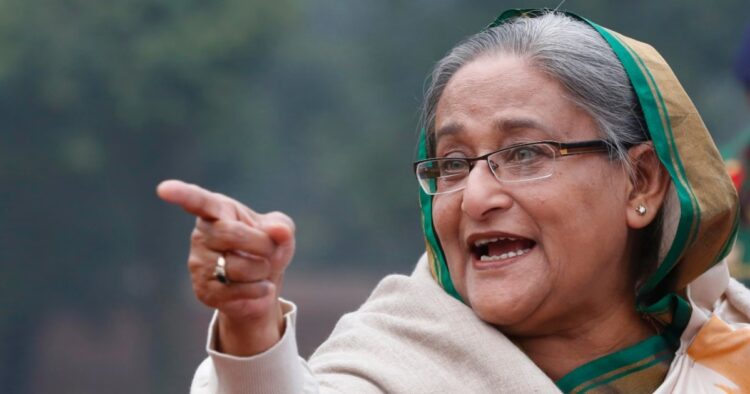Sheikh Hasina, the former Prime Minister of Bangladesh, has made serious allegations against the United States, claiming that they were behind her removal from power. On August 11th, the Economic Times reported her statement, which was conveyed through her close associates. Hasina, who is currently in India after being forced to leave Bangladesh due to violent protests, stated that the U.S. orchestrated her ouster because she refused to hand over Saint Martin Island. According to her, this would have given the U.S. control over the Bay of Bengal.
In her message, Hasina urged the people of Bangladesh not to be manipulated by radicals, warning them against external influences. She explained that she resigned from her position as Prime Minister to prevent further bloodshed, as she believed her opponents wanted to come to power by causing violence. Hasina said that she could have remained in power if she had agreed to the U.S. demands but chose to protect Bangladesh’s sovereignty instead.
Saint Martin Island and U.S. Military Interests
Hasina claimed that the U.S. wanted Saint Martin Island to build a military base, which she refused to allow. She emphasized that staying in Bangladesh would have led to more loss of life and destruction of resources. Hasina expressed deep sorrow over the violence that followed her resignation, particularly the targeting of her party members and supporters. She vowed to return to Bangladesh soon and continue to pray for the nation’s future.
Hasina also addressed previous comments she made about student protesters, clarifying that she never called them “Razakars” (a derogatory term in Bangladesh). She insisted that her words were twisted to incite the protesters, who were being used by conspirators to destabilize the nation.
Accusations of U.S. Involvement in Bangladesh’s Political Turmoil
This is not the first time Sheikh Hasina has accused the U.S. of attempting to overthrow her government. Earlier in April, she informed the Bangladeshi parliament about an alleged U.S. plan to remove her from power, stating that they wanted to replace her with a government that would be more aligned with American interests.
Reports from the Economic Times suggest that leaders of Hasina’s party, the Awami League, also believe the U.S. played a role in the recent political turmoil.
There have been accusations against a senior U.S. diplomat who visited Dhaka in May, claiming that he pressured Hasina to take action against China. American Ambassador to Bangladesh Peter Haas has also been accused of supporting the opposition party, the Bangladesh Nationalist Party (BNP). Haas finished his term in July, but suspicions about U.S. involvement in Bangladesh’s internal affairs have continued to grow.
Russia has also weighed in on the situation, with Foreign Ministry spokeswoman Maria Zakharova warning in December 2023 that the U.S. would try to overthrow Hasina’s government if she returned to power in the 2024 elections. Zakharova compared the potential situation in Bangladesh to the “Arab Spring,” suggesting that the U.S. could create chaos to achieve a regime change.
Saint Martin Island, a small island near the southern tip of Bangladesh, has been a point of contention between Bangladesh and Myanmar. The island is strategically important, and Hasina has previously accused the U.S. of wanting to build an airbase there. In June 2023, she claimed that the BNP wanted to sell the island to gain power and accused the U.S. of trying to destabilize her government to achieve its goals.
Despite these claims, the U.S. has officially denied having any discussions about taking over Saint Martin Island. In June 2023, a spokesperson for the U.S. Department of State stated that the U.S. respects Bangladesh’s sovereignty and has never engaged in conversations about the island.
Speculation about U.S. involvement in Sheikh Hasina’s removal from power has been widespread, with some suggesting that it was part of a regime change operation by the U.S. deep state. The role of the U.S. Agency for International Development (USAID) has also been questioned, with allegations that it has been involved in regime change efforts in other countries.
USAID has provided significant funding to organizations in Bangladesh, leading to suspicions about its true intentions.
The situation in Bangladesh has raised concerns about foreign interference in the country’s internal affairs, particularly from the U.S. As Sheikh Hasina prepares to return to Bangladesh, the question of who was behind her ouster remains a topic of intense debate.

















Comments